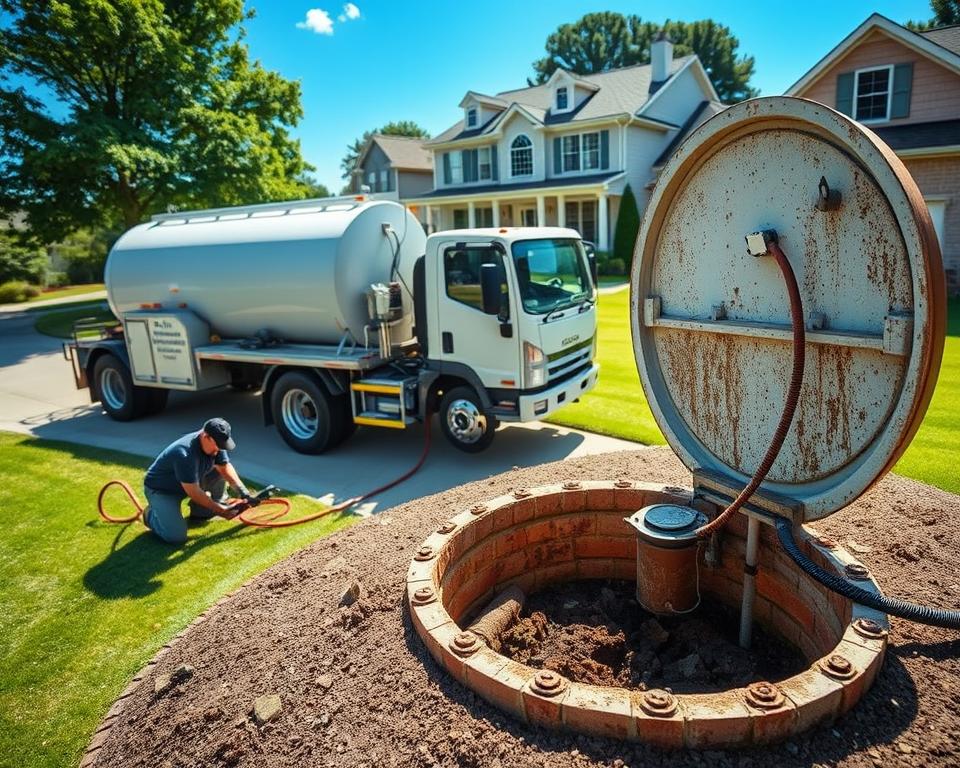Septic Tank Pump Out: Must-Know Advice & Guidance
Have you considered just where your used water ends up after it drains from your kitchen sink or loo? It’s handled by a well-maintained septic system. Grasping the significance of septic tank pump-outs is essential for first-rate waste management at home. Neglecting this may cause backups and expensive remedies. Our guide aims to highlight the importance of septic cleaning and scheduled pump outs. By calling on dependable septic services – septic tank pumping near me, you shield your property, nature, and support your system’s longevity.
Major Insights
- Consistent septic tank pump out avoids system failures and backups.
- Understanding your septic system supports effective maintenance.
- Arranging a pump out is essential for sound waste management.
- Stay alert to indicators that suggest your septic tank requires service.
- Selecting a certified service provider can enhance system efficiency.
- Paying for septic tank cleaning services protects your home and the environment.
The Importance of Septic Tank Pump Out
Booking a septic tank pumping service regularly is critical for your system’s life span and performance. Over time, your tank collects solid waste and organic debris, that may cause performance issues or even complete system failure. Without septic system maintenance, you could face obstructed pipes and damaged drain fields – problems that typically come with high costs and significant inconveniences for the household.
By getting professional septic tank services handle scheduled maintenance, you make sure your system runs smoothly. This step not only sidesteps costly fixes but also shields the soil and groundwater around your home from pollution. When you opt for regular pump outs, you foster environmental health and enjoy a steadfast and efficient system for managing waste.
How Your Septic System Works
A conventional septic system is pivotal in handling household wastewater. It’s made up of the septic tank, drainfield, and soil – elements that function in tandem to properly process waste. The septic tank provides a contained space for solid waste to decompose biologically.
It’s crucial for homeowners to understand how these parts work. Preserving the septic system in prime form is key to its longevity and effectiveness. Through regular inspections and cleaning the septic tank when necessary, owners can dodge hefty breakdowns that could cause serious health and environmental issues.
Regularly maintaining your septic system secures your property and supports public health. Below, see a table showing the different septic system components and their functions:
| Component | Function |
|---|---|
| Septic Tank | Holds and breaks down solid waste through anaerobic bacteria. |
| Drainfield | Releases the treated effluent into the soil for further filtration. |
| Soil | Acts as a natural purifier to further treat wastewater. |
Knowing these elements highlights the need for careful septic system care. Effective operation depends on consistent maintenance and cleanings by homeowners.
How Often Should You Schedule a Pump Out?
Understanding when to get your septic tank pumped is essential for its health. Generally, a septic pump out should occur every three to five years. However, certain variables might change this schedule.
The occupancy level in your home greatly affects the pumping frequency. Larger families mean more wastewater, resulting in more frequent maintenance. Moreover, habits like excessive laundry or extended bathing might necessitate quicker pump outs. Being proactive can significantly prolong your septic system’s life.
It’s smart to account for individual elements, such as tank size and daily water use, to keep a proper schedule. Remembering your last pump out date helps with timely planning for the next one, guaranteeing uninterrupted system performance.
Warning Signals for Pump Out
Homeowners should be vigilant for indications that show their septic tank requires service. Delayed sinks and toilets often point to an overfilled septic system, slowing the wastewater flow. Moreover, unpleasant smells around your home could mean trouble; they may come from the tank, signalling system failure.
Visible wastewater pooling in the yard is another major indicator. Should you notice wet spots or unexplained puddles, it’s likely your septic system is overwhelmed. Ignoring these signs can escalate into more severe issues that interrupt your home and become costly to resolve.
To avoid serious complications, timely maintenance is key. Engaging a professional service like All in Sanitation can be a smart move. They can accurately diagnose and rectify these signs. This method not only resolves immediate issues but also preserves your system’s efficiency and health.

Choosing a Professional Septic Tank Pump Out Service
It’s essential to select a qualified septic tank pumping service to maintain your system performing properly. Reliable companies are familiar with the local regulations thoroughly, making sure your septic system meets all requirements. A dependable service, like All in Sanitation, is dedicated to disposing of waste in an eco-friendly manner. This is important for the environment’s well-being.
While looking for the right septic service, weigh these important aspects:
- Experience and Reputation: Look for companies with excellent feedback and established success in your region.
- Licensing and Insurance: Ensure that your preferred provider has the proper license and insurance to cover unexpected problems.
- Comprehensive Services: Select a service that bundles inspections with pumping, identifying issues before they get worse.
Putting money into a quality septic tank pumping service prevents costly future repairs. Periodic evaluations and consistent upkeep ensure your system in prime shape. Choosing wisely not only secures your investment but also supports a robust waste management system for your home.
Cleaning Your Septic Tank
For homeowners, septic tank cleaning is essential to keep the system runs efficiently. During this process, eliminating sludge and scum is critical to avoid blockages. A well-serviced system not only runs smoothly but also lasts longer. Performing regular cleanings is crucial for the health of your system.
Numerous owners seek extra services to boost septic tank care. These extras are important for destroying harmful bacteria and preventing residue build-up. Recognizing the importance of proper maintenance can save you from expensive fixes. Keeping up with maintenance guarantees both environmental safety and household well-being.
Cost of Septic Tank Pumping Services
Homeowners should grasp septic tank pumping costs for effective system maintenance. Prices range considerably due to area, tank size, and selected service provider. On average, this service costs between $200 and $600. It’s advisable to compare quotes from various companies, evaluating both expertise and reliability.
Service providers like All in Sanitation supply affordable rates. Yet, the cost of septic tank cleaning reflects service quality and thoroughness. Homeowners should balance these aspects carefully when choosing a service.
Reviewing quotes enables make informed choices that suit your budget and septic system needs. Knowing potential costs aids in financial planning for septic tank upkeep.
Homeowner Maintenance Tips
Caring for your septic system well is essential. It secures a robust and efficient setup. By implementing simple steps, the longevity of your septic tank extends, alongside money. Measures like cutting back on water wastage in your household play a critical role. Addressing leaks promptly and opting for water-saving appliances are helpful actions.
It’s essential to not flush harmful substances down the drain. Chemicals, fats, or any materials that don’t break down easily hurt your septic system. For the wellbeing of your setup, discard such waste correctly. This practice preserves your septic tank’s natural processes.
Consistent inspections and the occasional pumping are non-negotiable for septic maintenance. Try to have your system inspected and serviced every three to five years. A maintenance schedule or checklist can be highly effective. It supports you in checking their system’s condition and sticking to maintenance guidelines.
Being proactive with septic maintenance delivers financial and environmental benefits. By incorporating these habits, homeowners boost their septic systems’ efficiency and dependability. This approach not only protects your system but also promotes a healthier environment.
The Bottom Line
A septic tank pump out is vital for septic tank upkeep, and property owners should consider it seriously. It wards off costly fixes and improves the system’s lifespan, allowing for smooth operation over years. Recognizing when to respond to system distress signals shields your property.
Choosing a trusted provider, like All in Sanitation, changes the game in septic tank care. Their expertise guarantees proper service, promoting both environmental health and your home’s comfort. Proactive maintenance protects your investment and promotes a greener planet.
Being knowledgeable about your septic system and its maintenance needs is key. Scheduled pump outs boost home functionality and support public health. For any homeowner, grasping the importance of septic tank care secures a well-functioning living environment for the future.


